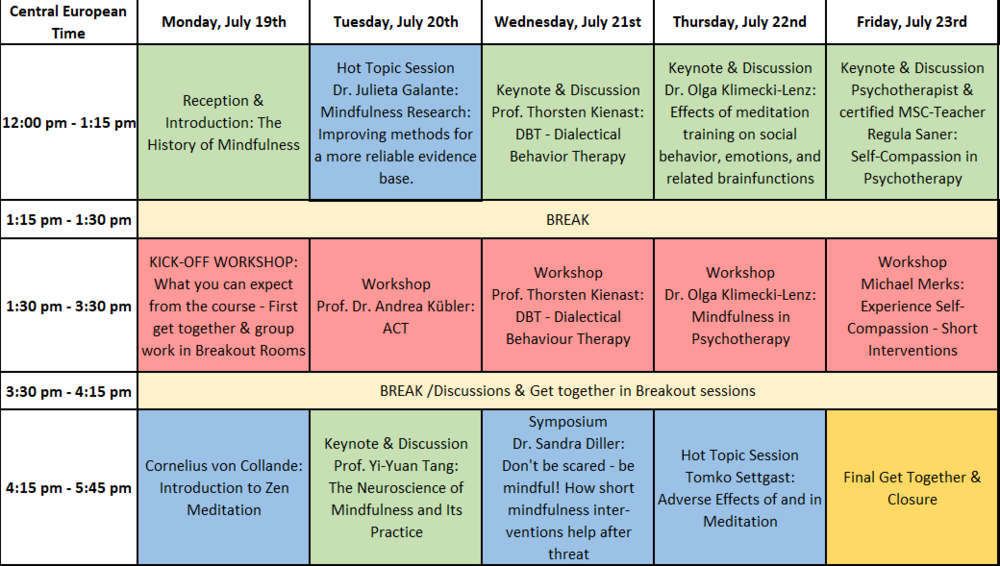Course Program

Keynotes 
-
Prof. Dr. Andrea Kübler: Reception & Introduction: The History of Mindfulness
This introductory keynote will first give you a brief overview of the
history of mindfulness from the Buddhist roots to the established
mindfulness based intervention tools in psychotherapy. You will have
the opportunity of experiencing first spotlight mindful excersises.
Finally an overview of the entire summer module course will be provided.
- Prof. Yi-Yuan Tang: The Neuroscience of Mindfulness and its Practice
"The lecture will focus on neural and biological mechanisms of mindfulness practice. Representative findings using brain imaging, physiological, and psychological approaches will be discussed to illustrate the potential of mindfulness in promoting health and well-being. This lecture will also discuss translational applications of mindfulness in attention control, stress resilience, emotion regulation, and behavior change. Finally, using IBMT as an example, an effective way of mindfulness practice will be proposed."
-
Prof. Thorsten Kienast: DBT - Dialectical Behavior Therapy
Dialectical Behavior Therapy (DBT) is a scientifically proven and effective treatment for clients with Borderline Personality Disorder. It is framed as a so called “third wave behaviour psychotherapy” following a behaviour and cognitive approach. DBT is one of todays most effective psychotherapy program for clients with personality disorder. And even more striking: DBT is one of the first treatments that introduced mindfulness action-based skills as a base to change dysfunctional behaviour.
For clients this therapy program teaches the five skills modules 1) how to reduce stress, 2) to handle difficult and intensive emotions including emotions that lead to suicidal behavior, 3) to increase social skills and 4) to increase mindfulness to an extent that a normal fulfilling life will be finally possible. Only in german spoken trainings 5) a set of six self-confidence training skills had been included by Martin Bohus.
On the other hand DBT-Therapists are trained in a) setting goals in even complex borderline clients, b) applying validation strategies correctly, c) living DBT-core believes. These three sets of skills transform therapists into effective DBT therapists and DBT trainers – the core of any DBT treatment.
In this lecture both an introduction and an overview to Dialectical Behavior Therapy, including all five clients’ skills modules as well as therapist skills will be given. The lecture is based on Marsha Linehans latest Textbook “DBT Skills Training Manual, The Guilford Press London/New York in 2015”
-
Dr. Olga Klimecki-Lenz: Effects of meditation training on social behavior, emotions and related brain functions
"In my talk, I will give an overview of latest research on how meditation training can change social behavior, emotions and related brain functions. I will discuss the limits of extant studies and their meaning for today’s society."
-
Regula Saner: Effects of Self-Compassion
"Self-Compassion is a key factor in mental health with wide-ranging implications for psychotherapy. But today, Self-Compassion is used explicitly in psychotherapy and appears to favor a transdiagnostic and transtheoretical change process, that underlays most - if not all - forms of therapy. A new paradigm is emerging: The Mindfulness-, Acceptance- and Compassion based Psychotherapy. In this talk you will learn about
-
the historical context of compassion in psychotherapy - the three components of self-compassion
- the three levels of integration of compassion into psychotherapy
and gain deeper understanding of the compassionate therapeutic relationship, formed on the 3 R's, being Radical acceptance, Resonance and Resource building."
Hands-on Workshops 
-
KICK-OFF Workshop: What you can expect from the course & first Get Together
-
Prof. Dr. Andrea Kübler: ACT - Aktzeptanz-Commitment-Therapie
-
Prof. Thorsten Kienast: DBT - Dialectical Behaviour Therapy
This workshop refers to the keynote lecture and will give participants practical experience to the usage of very useful but more complex to learn DBT-Skills. Once trained in a Workshop, we made the experience that “complex” dissolves into “easy to apply”. Content is based on the will of the students. However, a suggested selection is an experiental approach to the skills listed below:
- self-confidence skills,
- long term stress regulation skills
- validation strategies
- the correct usage of DBT-core believes
- Setting goals in complex Borderline clients
-
Dr. Olga Klimecki: Mindfulness in Psychotherapy
"In the workshopw Mindfulness in Psychotherapy participants will learn about different possibilities of including mindfulness meditation in psychotherapy. The workshop will emphasize how to implement mindfulness practices in a trauma-sensitive way. We will also practice meditation and engage in dyadic and group exercises"
-
Michael Merks: Experience Self-Compassion - Short Interventions
"Working with self-compassion requires embodiment of compassion and self-compassion, and a working style that is consistent with the meaning of compassion and self-compassion. The goal of the workshop is giving participants a felt-sense of all three components of self-compassion. Interventions will include mental, emotional and physical aspects."
Hot Topic Sessions & Symposia 
-
Cornelius von Collande: Introduction to ZEN Meditation
"The module contains a historical, theoretical and practical introduction to Zen meditation.”
-
Dr. Julieta Galante: Mindfulness Research: Improving methods for a more reliable evidence base.
"In this session we will explore some of the main methodological challenges in applied mindfulness scientific research and discuss ways of improving and enriching it. We will review general problems and possible directions, highlighting solutions that are feasible even with limited budgets. Different methodologies will be considered. Particular attention will be paid to randomised controlled trials, since they have been playing a unique role providing evidence in support of mindfulness training that has caught the eye of the wider scientific community, policy makers, and the public."
-
Dr. Sandra Diller: Don‘t be scared, be mindful! How short mindfulness interventions help after threat
"The past year has taught us that difficult situations can make us feel anxious and distressed: Our basic needs were threatened, as we both were reminded of our own mortality and risk of infection as well as were feeling isolated and restricted in our freedom. Many other situations can be threatening as well, such as feeling incompetent at work or experiencing difficult interpersonal situations. To reduce stress and anxiety, mindfulness interventions can be a promising approach. In her symposium "Don’t be scared – be mindful: Today’s challenges and the help of mindfulness" Ass.-Prof. Dr. Sandra Diller will give us an insight into the current state of research, whilst also presenting the results of her latest studies on mindfulness interventions after threatening situations (Diller et al., submitted) and on how mindfulness during working from home can have positive emotional and organizational effects (Diller, in progress). Furthermore, she will share some projects from a mindfulness seminar (winner of the distance teaching award 2020; projects from 2020 and 2021), where future teachers developed an intervention for their pupils for helping with different Covid-related threatening situations. This theoretical input will be accompanied by a variety of interactive exercises."
-
Tomko Settgast: Effects of and in Meditation
"Although, the phenomenon of adverse effects in meditation seems to be known for a while now (Castillo, 1990; Shapiro Jr, 1992), only recently the interest in the topic seems to increase (Farias et al., 2020; Lambert et al., 2021; Vieten et al., 2018). Thereby, the chosen umbrella term of adverse effects spans a wide variety of different experiences, ranging from solely challenging experiences during meditation to severe side-effects. This hot topic session is designed to be both an introduction in how to address this issue from a scientific perspective as well as a room for the exchange of personal experiences with adverse effects of meditation. It will be elucidated with which kind of different adverse or harmful effects do we have to deal as researchers in the contemplative sciences, from which moment on adverse experiences turn into harmful side-effects and why some meditators seem to be immune to these adverse effects. Not least, we will discuss if the increasing recognition of these adverse effects as irrefutable parts of the experiences within meditation or contemplative practices, has to bring forth an own ethics of the meditations’ teachings and instructions."


